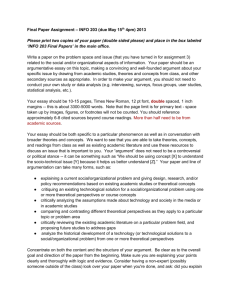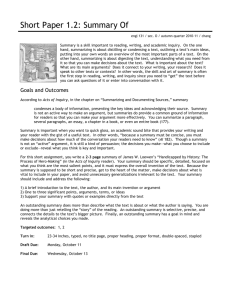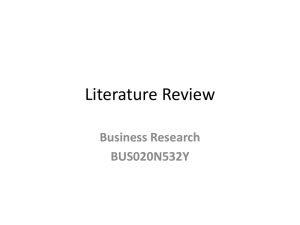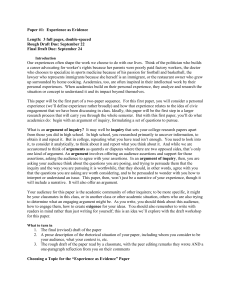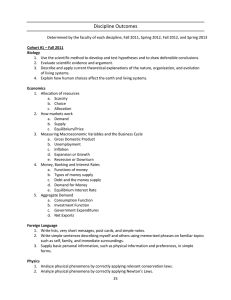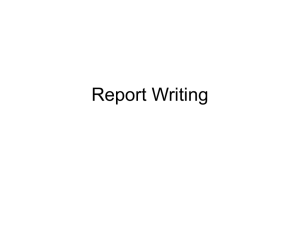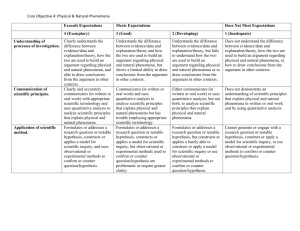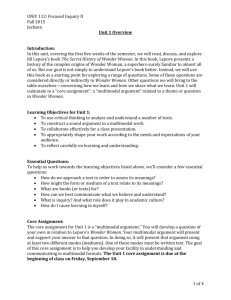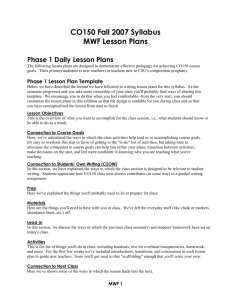IFA 1201 - Makerere University Courses
advertisement
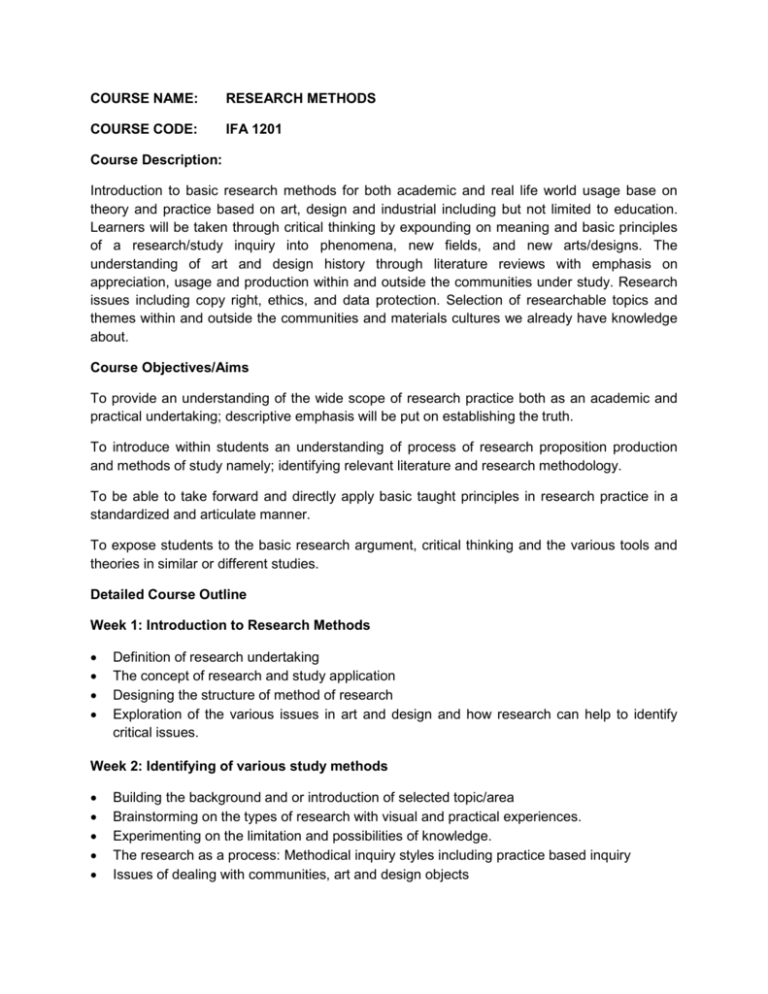
COURSE NAME: RESEARCH METHODS COURSE CODE: IFA 1201 Course Description: Introduction to basic research methods for both academic and real life world usage base on theory and practice based on art, design and industrial including but not limited to education. Learners will be taken through critical thinking by expounding on meaning and basic principles of a research/study inquiry into phenomena, new fields, and new arts/designs. The understanding of art and design history through literature reviews with emphasis on appreciation, usage and production within and outside the communities under study. Research issues including copy right, ethics, and data protection. Selection of researchable topics and themes within and outside the communities and materials cultures we already have knowledge about. Course Objectives/Aims To provide an understanding of the wide scope of research practice both as an academic and practical undertaking; descriptive emphasis will be put on establishing the truth. To introduce within students an understanding of process of research proposition production and methods of study namely; identifying relevant literature and research methodology. To be able to take forward and directly apply basic taught principles in research practice in a standardized and articulate manner. To expose students to the basic research argument, critical thinking and the various tools and theories in similar or different studies. Detailed Course Outline Week 1: Introduction to Research Methods Definition of research undertaking The concept of research and study application Designing the structure of method of research Exploration of the various issues in art and design and how research can help to identify critical issues. Week 2: Identifying of various study methods Building the background and or introduction of selected topic/area Brainstorming on the types of research with visual and practical experiences. Experimenting on the limitation and possibilities of knowledge. The research as a process: Methodical inquiry styles including practice based inquiry Issues of dealing with communities, art and design objects Week 3: Types of Research and research processes Human beings and the inquisitive mind Experimental, correlation, naturalistic, observation, survey and case study research Basic inquiry and complex variables and relationship in phenomena. Advantages and disadvantages of using various types of research. Keeping a log in reading and research. Assignment on research processes Week 4: Research in Context The stimuli to undertake research or study: The theoretical perspectives Different hypotheses and conceptual tools needed for research The practical and theoretical worlds – the real life world Research objectives, aims, justification and significance Forming research concepts from simple known phenomena Week 5: Critical thinking in academia Thinking index – abstract, ambiguity, analogy, analysis, a-posteriori a- priori Argument ; axioms, brainstorming, deduction, empirical, falsification and induction Logical thinking, rationality, reason, proof, hypothesis and explans Reflection, skeptic, synthesis, theory and theory structure Week 6: Identification of Methodologies Research theory/concepts, identification of relevant literature to support the argument. Literature as a gap filler, highlighter and strengthener Identification and selection of literature review themes, based on study variables. Research citation formats – APA, Harvard etc Week 7: The Research Tools Identification of research questions from the topic and study problem/issue Investigations assumptions Research apparatus, style and design. Conversations in research Observation tools in research Week 8: Practical and Theoretical Tools Test involving both research theory and practical will be administered. Research Design. Sampling in research and studies Test on the theories and tools Week 9: Introduction to Measurements and Data collection Sampling techniques and methods Measurements in art, design and education researches Data collection techniques Data analysis and processing Data control measures Week 10: Research Limitations and Ethics Getting Clearances Requesting consents Ethical considerations in research Scope in studies and the issues of politics Rules and guidelines for setting up research sites Week 11: Developing a Draft write up Formulation of possible topics and areas of interest. The triad argument Sourcing information form resource centres Online searches Writing style and practice. Week 12: Reading Exercises Quick reading and how to identify useful text The use of text Orality vs textual issues Citation and the power of writing Meanings in texts and reading between the lines Week 13: Exploration of Research writing possibilities The journals as source of information The world wide web - www Sourcing information and the limitations Plagiarism Respect for sources Week 14: Compilation and Writing Techniques Compilation of material for research Writing formats for different audiences Threads in writing Academic writing Preparation for research proposal writing Week 15: Research design and practice (project) assignment Set out research project for the students Design development for subsequent topic of proposal Formats of proposal and research reports Evaluation of the written project Week 16 and 17: University Examinations Learning outcomes The student will be capable of freely carrying out topical argument both verbal and written. Topics and issues concerning real life interventions will be encouraged. The student will acquire an appreciation of research production, and developing techniques in research and the criteria for their selection or argument and topics. The student will be able to appreciate the open ended, multi-disciplinary nature of research methods and how it relates in real life world. Method of Teaching/delivery Demonstration, instruction and theoretical inputs Lecture Practical class work and experiments Group discussion/presentation/critique Self directed critical assignment/ independent projects and course work Visual research and text collection Library and archival visits Mode of Assessment Course work 40% Planning and Developmental studies/theories 10% Execution of the written work (Reasonable body of work) 20% Tests in theory based on research methodology 10% End of semester Examination: 60% Theory examination: 60% Final total work: 100% References/Learning materials Barnet Sylvan (2000) A short Guide to Writing about Art, Longman - Wesley, Addison Barrett Terry (1996) Criticizing Photographs: An introduction to understanding images, Mountain View, Mayfield Company Bernard H R (1995) Research Methods in Anthropology, Qualitative and Quantitative, Walnut Creek CA, Alta Mita Press Bourdieu Pierre (1977) Outline of Theory of Practice, Cambridge, Cambridge University Press Husserl Edmond (1950) The Idea of Phenomenology, tr. Aliston P and Nakhnikian G, The Hague , Martinus Nijhoff Sayre, Henry (1999) Writing about art, Upper Saddle River, Prentice Hall Tucker, Amy (2002) Visual Literacy: Writing about Art, McGraw Hill, Burr Ridge IL
